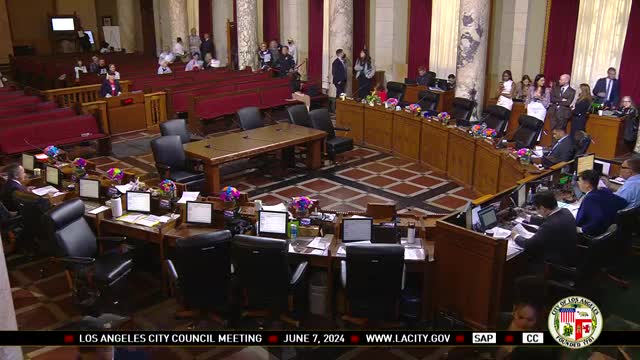Activists demand immediate ceasefire resolution in LA Council
June 08, 2024 | City Council, Los Angeles City, Los Angeles County, California

This article was created by AI summarizing key points discussed. AI makes mistakes, so for full details and context, please refer to the video of the full meeting. Please report any errors so we can fix them. Report an error »

During a recent Los Angeles City Council meeting, public comments centered heavily on calls for a ceasefire in Gaza, reflecting a growing grassroots movement among residents and organizations. Speakers from various backgrounds, including members of the Democratic Socialists of America and the California Faculty Association, urged council members to support a resolution for an immediate and permanent ceasefire, emphasizing the humanitarian crisis unfolding in the region.
One speaker, representing the California Faculty Association, highlighted the overwhelming support for a ceasefire among Los Angeles residents and urged council members to align with this sentiment. The speaker noted that many city councils across the region, from Santa Monica to Pasadena, have already expressed similar support.
Nina Mancus, a short-term rental host, voiced concerns about the financial burdens placed on hosts by the city, criticizing the proposed police permit requirement as excessive and detrimental to those trying to survive in a challenging economy. Other speakers echoed her frustrations, arguing that the city’s regulatory systems are failing to support compliant hosts while imposing additional costs.
Several speakers, including Molly and Javier Moro, reiterated the urgent need for the council to pass the ceasefire resolution, linking it to broader issues of social justice and human rights. They described personal experiences of violence and police negligence during protests, calling for immediate action to prevent further escalation of conflict.
The meeting also featured voices from the Jewish community, with speakers like Helen Sklar and Jeffrey Cooper emphasizing the moral imperative to act against the violence in Gaza. They urged the council to schedule a hearing on the ceasefire resolution, citing the dire humanitarian conditions reported in the region.
As the meeting progressed, the urgency of the ceasefire resolution became a focal point, with multiple speakers imploring the council to take decisive action before the summer recess. The discussions underscored a significant community push for the city to take a stand on international humanitarian issues, reflecting a broader trend of civic engagement in local governance.
One speaker, representing the California Faculty Association, highlighted the overwhelming support for a ceasefire among Los Angeles residents and urged council members to align with this sentiment. The speaker noted that many city councils across the region, from Santa Monica to Pasadena, have already expressed similar support.
Nina Mancus, a short-term rental host, voiced concerns about the financial burdens placed on hosts by the city, criticizing the proposed police permit requirement as excessive and detrimental to those trying to survive in a challenging economy. Other speakers echoed her frustrations, arguing that the city’s regulatory systems are failing to support compliant hosts while imposing additional costs.
Several speakers, including Molly and Javier Moro, reiterated the urgent need for the council to pass the ceasefire resolution, linking it to broader issues of social justice and human rights. They described personal experiences of violence and police negligence during protests, calling for immediate action to prevent further escalation of conflict.
The meeting also featured voices from the Jewish community, with speakers like Helen Sklar and Jeffrey Cooper emphasizing the moral imperative to act against the violence in Gaza. They urged the council to schedule a hearing on the ceasefire resolution, citing the dire humanitarian conditions reported in the region.
As the meeting progressed, the urgency of the ceasefire resolution became a focal point, with multiple speakers imploring the council to take decisive action before the summer recess. The discussions underscored a significant community push for the city to take a stand on international humanitarian issues, reflecting a broader trend of civic engagement in local governance.
View full meeting
This article is based on a recent meeting—watch the full video and explore the complete transcript for deeper insights into the discussion.
View full meeting
